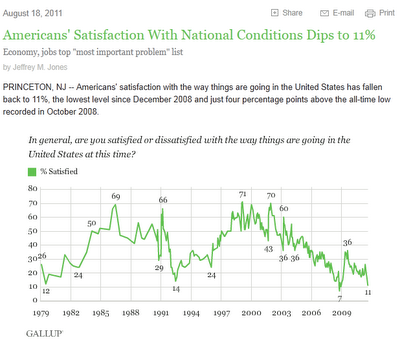Meanwhile, back at home...
The usual turn from unsatisfying wars abroad to happier domestic conditions, however, no longer seems tenable. In these August days, Americans are rubbing their eyes, still wondering what has befallen us with the president’s “debt deal” -- a shifting of tectonic plates beneath the economy of a sort Dick Cheney might have dreamed of, but which Barack Obama and the House Republicans together brought to fruition. A redistribution of wealth and power more than three decades in the making has now been carved into the system and given the stamp of permanence.
Only a Democratic president, and only one associated in the public mind (however wrongly) with the fortunes of the poor, could have accomplished such a reversal with such sickening completeness.
One of the last good times that President Obama enjoyed before the frenzy of debt negotiations began was a chuckle he shared with Jeff Immelt, the CEO of General Electric and now head of the president’s outside panel of economic advisers. At a June 13th meeting of the Council on Jobs and Competitiveness, a questioner said he assumed that President Obama knew about the difficulties caused by the drawn-out process of securing permits for construction jobs. Obama leaned into the microphone and offered a breezy ad-lib: “Shovel ready wasn’t as, uh, shovel-ready as we expected” -- and Immelt got off a hearty laugh. An unguarded moment: the president of “hope and change” signifying his solidarity with the big managers whose worldly irony he had adopted.
A certain mystery surrounds Obama’s perpetuation of Bush’s economic policies, in the absence of the reactionary class loyalty that accompanied them, and his expansion of Bush’s war policies in the absence of the crude idea of the enemy and the spirited love of war that drove Bush. But the puzzle has grown tiresome, and the effects of the continuity matter more than its sources.
Bush we knew the meaning of, and the need for resistance was clear. Obama makes resistance harder. During a deep crisis, such a nominal leader, by his contradictory words and conduct and the force of his example (or rather the lack of force in his example), becomes a subtle disaster for all whose hopes once rested with him.
The philosopher William James took as a motto for practical morality: “By their fruits shall ye know them, not by their roots.”
[...]
The Obama presidency has been characterized by a refined sense of impossibility. A kind of suffocation sets in when a man of power floats carefully clear of all unorthodox stimuli and resorts to official comforters of the sort exemplified by Panetta. As the above partial list of the saved and the sacked shows, the president lives now in a world in which he is certain never to be told he is wrong when he happens to be on the wrong track. It is a world where the unconventionality of an opinion, or the existence of a possible majority opposed to it somewhere, counts as prima facie evidence against its soundness.
So alternative ideas vanish -- along with the people who represent them. What, then, does President Obama imagine he is doing as he backs into one weak appointment after another, and purges all signs of thought and independence around him?
[...]
Obama’s pragmatism comes down to a series of maxims that can be relied on to ratify the existing order -- any order, however recent its advent and however repulsive its effects. You must stay in power in order to go on “seeking.” Therefore, in “the world as it is,” you must requite evil with lesser evil. You do so to prevent your replacement by fanatics: people, for example, like those who invented the means you began by deploring but ended by adopting. Their difference from you is that they lack the vision of the seeker. Finally, in the world as it is, to retain your hold on power you must keep in place the sort of people who are normally found in places of power.
















